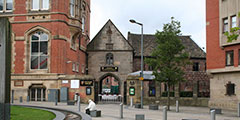“Tell me and I forget. Teach me and I remember. Involve me and I learn.”
– Benjamin Franklin
Chetham’s library was founded in 1653, and is the oldest public library in the UK. The beautiful sandstone building dates back to 1421, when it was a priest’s college.
During the Civil War, it was used to store weapons and gunpowder.
Humphrey Chetham, a wealthy banker, made a will to establish this library and 5 ‘chained’ libraries in local churches. He also funded a school for underprivileged boys, the Chetham School and Hospital – so called because it was a place for shelter as well as education. He believed that overcoming ignorance could help overcome poverty. The School is now a specialist music college next door but the library, an independent charity, offers free entrance to readers and visitors as Chetham intended.
The library collection began in 1655 and is still growing. It is of international importance and continues to be used for research and reference. It was famously used by Karl Marx and Friedrich Engels in the 1840s: they worked on studies of social problems at a wooden table in the Reading Room. Engels’ influential book The Condition of the Working Class in England was published in 1844. Engels wrote to Marx in 1870:
‘During the last few days I have again spent a good deal of time sitting at the four-sided desk in the alcove where we sat together twenty-four years ago. I am very fond of the place’.
The desk is still beneath the window, and the Reading Room looks very much as it would have done when Marx and Engels were readers there.
Manchester is well known as a pioneer of education and a centre for literature, learning and research. When the Free Libraries Act was passed in 1850, the city’s Mayor oversaw a campaign to build a ‘free’ library for all Manchester’s citizens – the first free public library in the world. A new Central Library was opened near the Town Hall in 1934. It’s one of the largest public lending libraries in the UK.
Other city libraries include the University of Manchester’s John Ryland’s Library on Deansgate. Its astonishing collection of rare and priceless works includes the oldest known piece of the Bible, the St John fragment. Like Chetham’s, the beautiful and historic setting of the collections gives a sense of peace and reflection to visitors.






 3 minutes
3 minutes